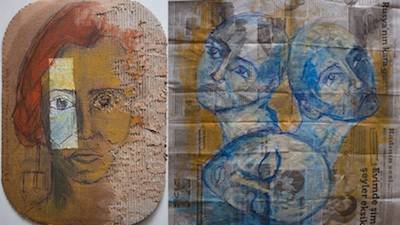The Swiss Freethinker Association ‘Frei Denken’ has bestowed this year’s the “Free Thought Award” to jailed Kurdish journalist-painter Zehra Doğan and Iranian journalist Masih Alinejad on Sunday. The award ceremony at Zurich Volksausstiftung was attended by many journalists and friends of Zehra Doğan. Doğan said in one of her letters read during the ceremony that “I will learn how to create existence out of a void.”
The award of Zehra Doğan, who is jailed in Diyarbakır E Type Prison since June, was given to their friends in her place. It was reported that some twenty reproductions of Zehra’s works were also exhibited along with a video shown for the first time on the occasion, produced by graphic artist Sébastien Lecoultre as a tribute to Zehra Doğan.
Speeches at the awards ceremony told about what the two female journalists have been through as victims of totalitarian regimes in their countries. The “Freethinker Prize” for Zehra Doğan was received by her colleagues Naz Öke and Lucie Renée Bourges from Kedistan, a webzine organizing and upholding the European solidarity campaign.
Since the visiting rules and internal communications in the high security prison in Diyarbakır she could not be informed on the award timely she could not write a special letter for the event, some excerpts from Zehra Doğan’s former letters were read in Turkish and English at the ceremony.

Doğan continued in a letter that “I draw and I paint whenever I can. And I’ve also started giving drawing classes to my friends here. In a way, I socialize art in my fashion. They love to draw. Soon, I’ll be able to teach them how to make a paintbrush out of bird feathers found in the yard… I wouldn’t like you to imagine a sad-sack withdrawn Zehra, wasting her time. I write to tell you everything I do here, so that when you hear and pronounce the name Zehra, you picture a woman with a strong morale and hope, someone who is strong and upright.”
She wrote in a letter that “I used to fear that in the absolute darkness of the walls built around me, with no knowledge of my roots, I would settle into the situation, reconcile myself with the persecution to which I am subjected, that I would lock myself into the jail of my inner world… In this space where everything is constantly restricted, where even a pencil is hard to find, I will learn how to create existence out of a void.”
The messages of Zehra Doğan went on as follow: “For someone with no reason to live, yes, jail is hard, even very hard. But my reason for living is powerful. This is why these walls become more immaterial for me with every passing day. No space in the world is totally free. Can you tell me that the space you are in right now is really free? I understand that in your struggles also there is no question of absolute freedom.
“And I think that in the search for freedom, women must stand in the front ranks. We must fight with even greater strength against masculine domination that decides how we must live, how we must talk, dress, wear makeup, what size and weight we must be, how we must behave sexually, and even how we must die. But I’m convinced we will shatter those dark glasses they have forced onto us… I send you all my love from a little prison filled with big-hearted women, in a town burnt and destroyed, far away from you.”
Lucie Renée Bourges has concluded that “As a woman, dominated by patriarchy and oppressed by a regime that instrumentalizes Islam in politics, just as the former regime called itself secular while imposing it as a state religion, freedom of thought is dear to Zehra. And when the judge had the court condemn her, claiming that her drawing of the destroyed town of Nusaybin went beyond “allowable limits for criticism”, I leave you to judge what freedom is left in Turkey.”
Turkey is the biggest jailer of journalists in the world. The most recent figures documented by the SCF has showed that 253 journalists and media workers are in jails as of November 5, 2017, most in pre-trial detention languishing in notorious Turkish prisons without even a conviction. Of those in Turkish prisons, 228 are arrested pending trial, only 25 journalists remain convicted and serving time in Turkish prisons. An outstanding detention warrants remain for 133 journalists who live in exile or remain at large in Turkey.
Detaining tens of thousands of people over alleged links to the Gülen movement, the government also closed down more than 180 media outlets after the controversial coup attempt.
















